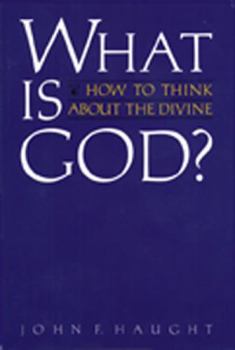What Is God?: How to Think about the Divine
Select Format
Select Condition 
Book Overview
Suggests five ways of thinking realistically about God by reflecting on profound human experience of depth, future, freedom, beauty, and truth. +
Format:Paperback
Language:English
ISBN:0809127547
ISBN13:9780809127542
Release Date:January 1986
Publisher:Paulist Press
Length:160 Pages
Weight:0.43 lbs.
Dimensions:0.5" x 5.4" x 8.1"
Customer Reviews
4 ratings
Tokens of transcendence
Published by Thriftbooks.com User , 15 years ago
I've used Haught's What Is God? as a college-level text several times, and I admire it more with each re-reading. That's why I was rather horrified to read the earlier negative review of it here. It's true that the book is written for a popular audience. But it's not at all true that the argument is simplistic. Instead, it's really a quite subtle argument, and one that Haught appeals to in his more technical theological writings. As I understand it, the gist of Haught's thesis is this: traditional arguments claiming to demonstrate the existence of God have little appeal these days (if they ever did) to unbelievers. So Haught doesn't wish to reinvent a wheel that's squeaky anyway. His project isn't to demonstate the existence of God, but more modestly--and fruitfully--to argue that a case can be made for taking seriously the possibility that God is. He does this by focusing on five ordinary but significant human experiences (he doesn't claim that they exhaust the possibilities): depth, future, freedom, beauty, and truth. There are two general ways to interpret such experiences: either they're bio-psychological phenomena that refer to nothing beyond themselves, or they're tokens of transcendence that point beyond themselves to a Source that grounds them--and this Source is a God candidate. So much for Haught's conclusions. For his arguments, a close reading of his book is necessary. Especially interesting is his analysis of the experience of the future, and the way in which he connects it with hope. All in all, a lovely and insightful book. Haught is one of our best contemporary theologians.
By no means is this a child's book
Published by Thriftbooks.com User , 16 years ago
I don't know whether the reviewer who gave this book one star confused it with another of the same title, as was suggested by another reviewer, or is merely a graduate student sounding pretentious. In any case, his remarks are completely off target. While this is an introductory text, it is by no means for children. It raises important questions and provides readers with a cognitive structure for the investigation of the nature of the divine. It may be a bit disturbing to ultra-orthodox Christians, be they Catholic or Protestant. If so, they probably should be disturbed. This is a worthwhile read for anyone who wishes to press beyond the catechism.
Previous review read the wrong book!
Published by Thriftbooks.com User , 18 years ago
The previous reviewer is (I think!) referring to a book with an identical title, authored by Etan Boritzer, which in fact was intended for grade-school children! The book by Haught was not at all "elementary", but was very thoughtful and thought-provoking.
"The Problem of God"
Published by Thriftbooks.com User , 19 years ago
Having taken my fair share of theology classes at Georgetown University, where Professor Haught is on the faculty, I look back fondly at the freshman year required course, "The Problem of God," for which this book was the Week One text. The course sets out to inspire in a green undergraduate the basic notion that "God" is a far separate thing than oragnized Christianity, and Haught's text serves to launch that discussion straightaway. It riffs on one main theme and in doing so, is meant to offer pause to the kid who is still learning to cross the quad without tripping.






